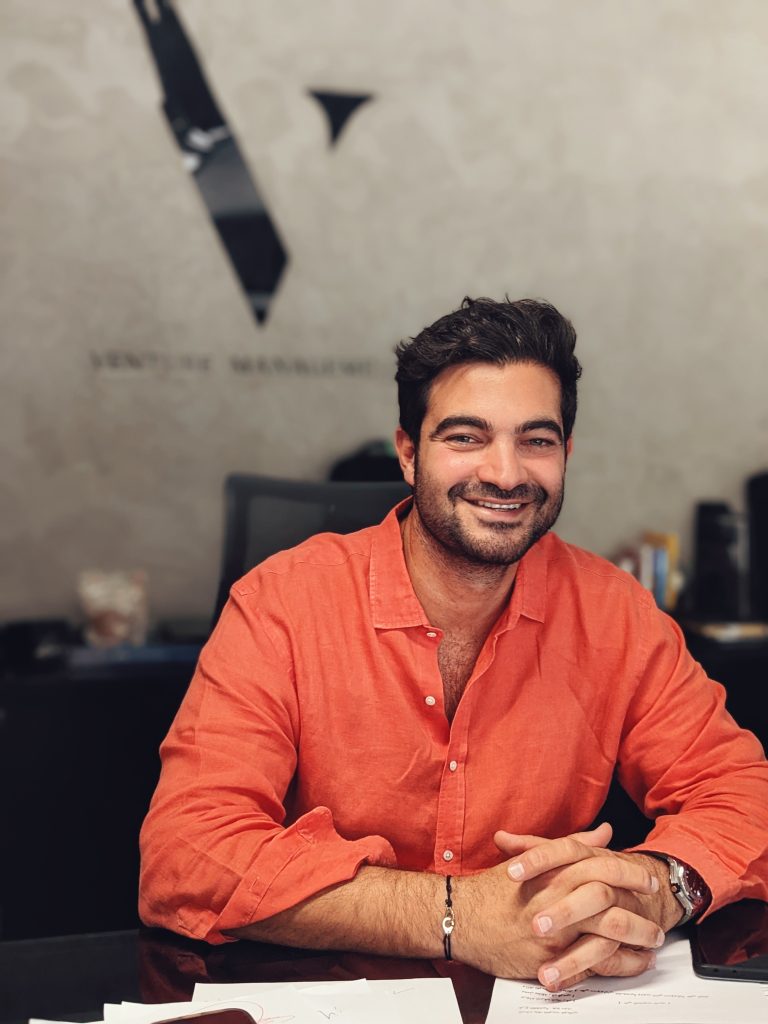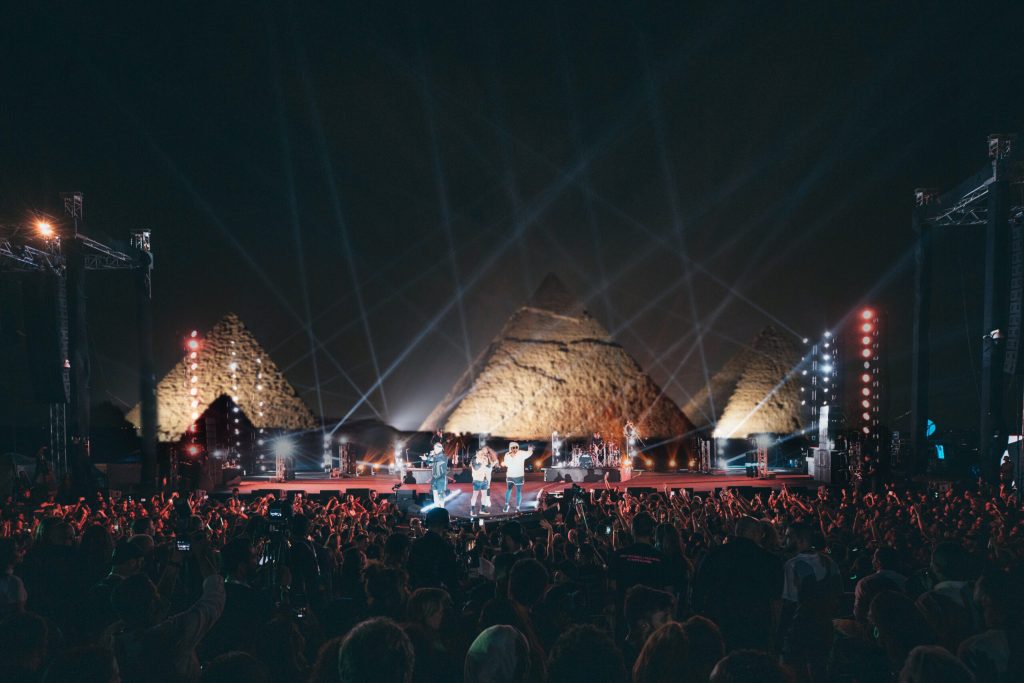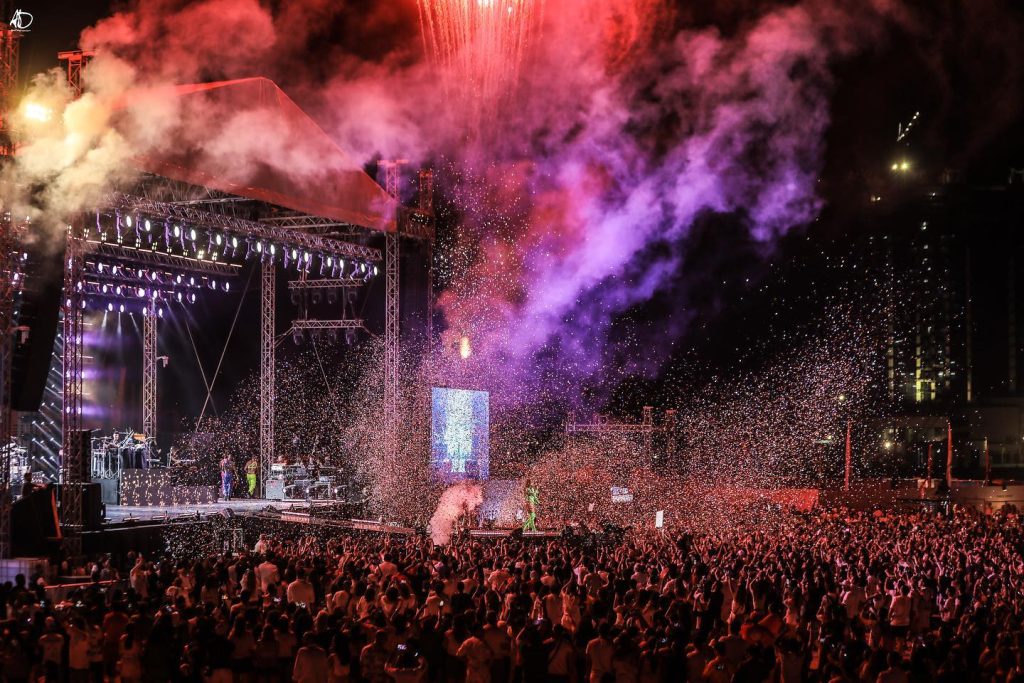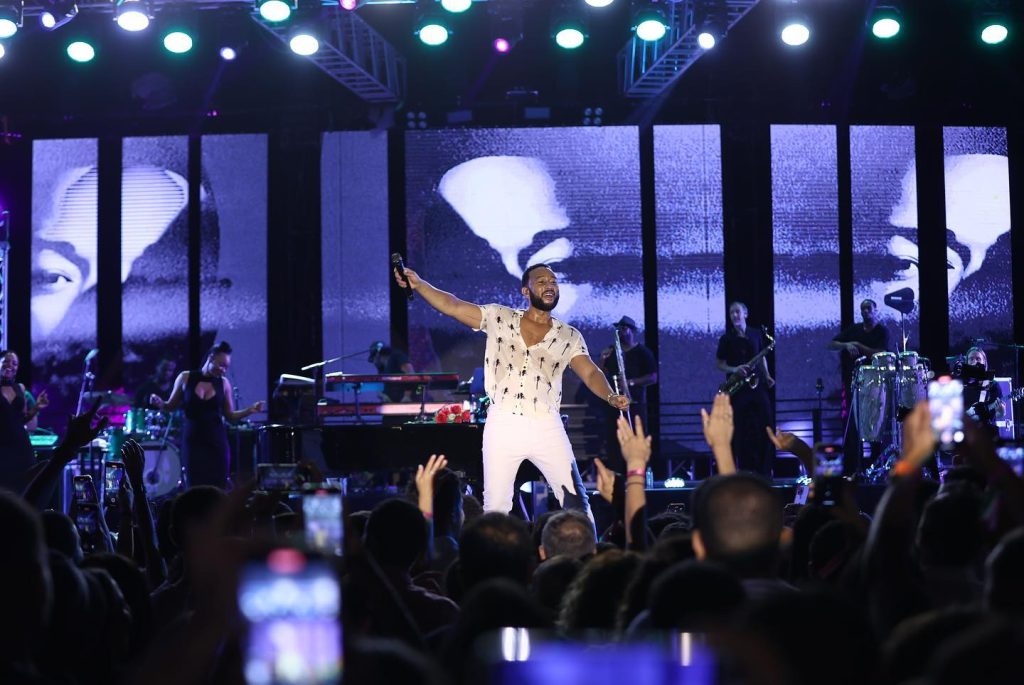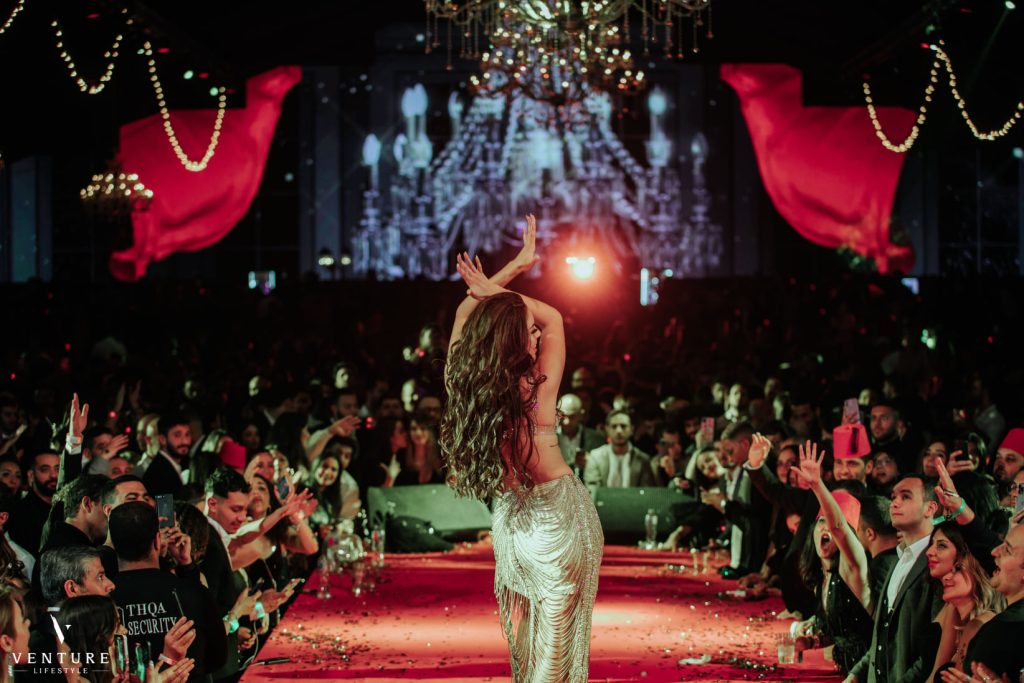We sat down with Rabih Mokbel, CEO and founder of Venture Lifestyle, who has made a name for himself by bringing icons like John Legend, Jennifer Lopez, and the Black Eyed Peas to perform in Egypt. From exciting concerts at the Pyramids of Giza, innovative fine dining experiences, a host of new bars popping up around the country, and recently signing a contract to develop hospitality and events at four of Egypt’s most important historical sites. Mokbel has made a mark on the nightlife, hospitality, events, and dining scene in Egypt and the wider region. In his exclusive interview with Scoop Empire, Mokbel gave us a whirlwind tour of his personal journey to the place he is now, plus an insight into the future of the nightlife and dining scene in the region, and offered his words of advice for young entrepreneurs in the region wanting to jump into the world of event organizing and hospitality.
There are many ways your life could have turned out, but you ended up organizing events and overseeing restaurants, bars, and clubs. What got you into hospitality and event organizing in the first place?
My father basically. I was born and raised abroad and my father used to do catering and food, and even fed the army of Saudi Arabia. So, I used to always go with him as a kid, going to kitchens, and serving and feeding people. I already liked this, but I wanted to take it to the next level.
So, I started with management and hospitality in hotels when I was 15 years old and I did internships in Spain, the United States, Dubai, and Lebanon. Then, by chance when I was 17 years old, I worked at this nightclub and bar, which was the first rooftop ever to open in Lebanon, called SkyBar. Basically, I was a very good salesman, not only a waiter. I was a waiter who could sell you anything on the menu in seconds and I got promoted really fast. Two years later, I became the manager of this place. So, for the next four years, I was the youngest manager in the region between Lebanon and Abu Dhabi handling this kind of thing. Here, I discovered that I love nightlife and I love events, so food was only the beginning for me. Hospitality and nightlife, food, weddings, banquets, everything, it was all connected for me. I kept working there until 2009 when we came to Egypt to open a SkyBar here. This was a very big success and we had huge plans, but then the revolution happened and our Egypt plans were canceled and I ended up back in Lebanon.
After this, I decided to go at it on my own in 2012. I opened my first place in Lebanon, which was a small bar that went very well, my first sole business, and that’s how it all started. From 2012 until now, I’ve been on my own and working in Dubai, Egypt, and now Oman and Qatar. We’re opening the biggest club during the World Cup and we’re doing huge concerts with fifteen, twenty thousand people in arenas around the World Cup and in Oman were doing a collaboration with Samih Sawiris and his real estate company in Salalah and As Sifah involving big events, starting Nov. 11.
In Egypt, we recently signed a big agreement with the government to manage four historical destinations: Egyptian Museum in Tahrir, Sakkara Pyramids, the Rokn Farouk Museum, and the Mohamed Ali Palace on the Nile. We also organized a celebration at the Egyptian Museum for the 200-year anniversary of the founding of Egyptology and last week we had a two-million dollar wedding at the Mohamed Ali Palace, and this is just us getting warmed up.
Did working from a young age and starting at the bottom teach you anything about the world of work and business? And what have you learned from the difficulties and complications you’ve faced along the way?
Working from a young age and starting in the kitchens and on the floor taught me that anything is possible. I’m sure you need some luck, but if you are given a chance and you take it and work hard, you can reach places. In terms of the difficulties I have encountered, I have learned as an entrepreneur that I shouldn’t have all my eggs in one basket. When COVID-19 came, all the restaurants closed and people who worked for them stayed at home, but those in the healthcare industry made a lot of money. This taught me about the importance of diversification. In addition, the Beirut port explosion, the devaluation of Lebanon’s economy, and the revolution in Egypt taught us to have different businesses in various countries. Now, we’re even in the process of opening the biggest dog food factory in Egypt, which will also export and so earn in foreign currencies. We originally only did entertainment, but now we’re going into healthcare and manufacturing. In the entertainment business, we have things going on in Oman, Qatar, Egypt, Lebanon, and Dubai, so if something happens in any of these countries, we can rely on what we’re doing elsewhere.
Why Egypt and what are you trying to bring to the table with your company Venture Lifestyle?
Egypt is a great market, and while we hope the currency stabilizes a bit, other than that it’s very good. We’re trying to change the perception of entertainers abroad about performing in Egypt. Big artists don’t see Egypt as a priority and we are trying to change this by making festivals that make them want to come and perform here, not by simply offering them more money for them to come. We want big-name artists to look at Egypt as they do Ibiza and Mykonos. We want them to think of Egypt as the it destination to play at. So, this is what we’re trying to do with our partners by changing the way we treat our international entertainers.
Egypt has seen the entrance of a whole host of Lebanese restaurants, bars, and clubs in recent years.
Yes, absolutely. A lot of them partner with us and a lot of them are going on their own, and we wish them the best of luck. The reason is simple, Lebanon’s economy has simply vanished in the last two or three years, and Lebanese entrepreneurs started hearing about Egypt. I’m not going to say this was only because of us, because there were others as well, but people started seeing bigger and bigger events and a few restaurants popping up and people started coming. People saw the potential and were curious about the Egyptian market. The Lebanese are nightlife people and they love going out, so they have a lot of experience in this regard to share.
What changes have you noticed in the nightlife scene in Egypt over the last few years and what do you think the future of the Egyptian nightlife scene holds?
The electronic scene. The electronic scene grew maybe 80 percent in the last five years. So, getting John Legend for a million dollars versus a DJ for 50,000 dollars, you’d make more money getting the DJ, it’s crazy. For the future, I think in Egypt it’s festivals. I’m hearing about a lot of festivals that will happen in Egypt as the government is becoming more friendly and open to the idea. We personally are planning something in the capital city and we’re preparing our first proper festival in Egypt, which will be a three-day thing with 100 DJs. That’s the next step because we’ve got everyone. The next step is to get The Weeknd, Coldplay, and others like this to come, and they’re ready, we just need to pay more.
As you were saying, you’ve made a name for yourself by inviting some big acts to Egypt.
Yes, we took the risk and got people like Jennifer Lopez, John Legend, the Black Eyed Peas, and others. All these people are so expensive and it’s very difficult to make money with them, but we have to make these sacrifices to make a name to build leverage, so we can negotiate with upcoming DJs and artists. They can’t tell us we don’t have the experience to host them, because we can say to them that their colleagues came. Now, we’re in a better position to negotiate and are in the middle of negotiating with The Weekend, which will hopefully happen very soon.
Looking toward the future, are there any musicians you’d love to bring to Egypt?
Florence and the Machine, Coldplay, the Back Street Boys, believe it or not, Dua Lipa, who is one of my top favorites I want to bring over, and Drake. We are trying to get these people and we think they will all come. Before COVID-19 a lot of people were planning on coming, but they had to cancel. Justin Bieber and Drake were even supposed to come. We’re working back from the start now and these big acts have a lot of rescheduling, so Egypt isn’t a priority at the moment. But it’s a new season and things are changing again.
You’ve put on some concerts with the incredible backdrop of the Pyramids of Giza, are there any other places in Egypt you’d like to host concerts at?
Yes, for sure. Definitely, Luxor and Aswan, which we are currently in talks to do hopefully some concerts and events there. Also, as I said earlier, we have now signed an agreement to manage events and hospitality at the Pyramids of Sakkara. We’re building a whole venue there and hopefully, we will start doing events there very soon.
You hosted an event at the Egyptian Museum in downtown Cairo to celebrate the 200-year anniversary of the founding of Egyptology as a field, but you also announced that you will be managing the location in terms of developing hospitality and events.
Yes, the Egyptian Museum is one of four historical locations we have an agreement with the government to manage for the next 15 years. We’re planning to have restaurants, bars, events, and all kinds of exciting things at the museum in Tahrir.
You’ve also got several projects across the Arab world.
In Abu Dhabi, we’ve done the events and parties for the Formula One Abu Dhabi Grand Prix for three years now. In Oman, we’ve put on some events with the government, and in Lebanon, we’ve done parties for many, many years. We’re now starting to do more and more in Qatar and Oman, especially with the World Cup coming up.
What do you think is the most important thing to consider when organizing a successful event?
The way people enter, the way people leave, and safety. These are the three main things. If the performer sucked, this isn’t on you, but if people come in and out smoothly, get back home safe, thought that the sounds and lights were good, this is you doing your job well, and everything else depends on the performer.
And finally, the Arab region is full of enthusiastic young people who want to host exhibitions, put on concerts, set up unique dining experiences, and generally try to do something different. But turning ideas into reality can be difficult, so what advice would you give them?
Deliver. The most common problem I hear is about promoters and entertainers not delivering what they promised. Let’s say you plan to do a small party, and you say you will get Will Smith, but then you get someone else, this is a problem. Not overpromising is one of the most important things that helped us make it in the market. We never made promises about getting a name and then turning around and saying, no sorry we can’t get them This is how to start, never overpromise.
WE SAID THIS: Don’t Miss… Beat Of Beirut: A Look Into North Coast’s New Popping Nightclub, Überhaus


